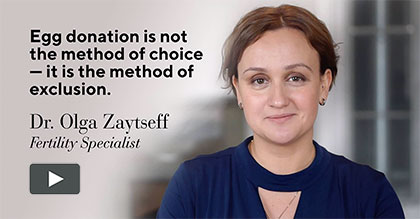
She enters the room and sits down, clearly nervous. Never having spoken to a therapist before, her tears start rolling before she is able to utter a single word. She has been carrying a great burden all alone. Even though she is not alone, she feels alone — alone with her thoughts. Destructive thoughts. Thoughts that try to tell her why she is not pregnant.
This has been her focus for four years. For the last four years, she and her partner have tried to have a child. First through intercourse, then through IVF (in vitro fertilization). But so far, no pregnancy. She has not become a mother; other women become mothers, but not her.
I ask her about the results of their fertility evaluation. She tells me that his sperm, although of poor quality, is good enough to be used in fertility treatment. Together we discuss common reactions and feelings during this treatment. She starts crying again, all too aware of what I am telling her.
When there is no pregnancy, we feel the need for a reason. Something to focus on, something to blame. It is difficult to accept that the result might be beyond our control. It seems senseless to not have anything concrete to blame.
Some of the most common thoughts I hear voiced during therapy are:
- I don’t deserve to become pregnant.
- This is my punishment for being unfaithful / my abortion / my divorce.
- My life is unhealthy. My diet is unhealthy and I don’t work out enough.
- I am not a good enough match for my partner.
- My body is unable to get pregnant.
- I have too many negative thoughts.
- It’s my fate to be childless.
These are common thoughts, and all too often the woman makes them into her personal truths. If you ponder something long enough, you risk reaffirming it and making it “true”. And when every month her body confirms that she is not pregnant, those “truths” grows stronger.
Gently I examined each of these “truths” with her:
What do you mean you don’t deserve to become pregnant? Could you really have made any decisions in the past that could have changed your current situation? Can anyone become pregnant through wishful thinking? No, you cannot. Is your body supposed to attract your egg, or is the embryo simply supposed to attach itself to the wall of your uterus? Are you really living a more unhealthy life than other women who become pregnant?
When a couple is undergoing fertility treatment, I tell them: “Now you can relax! Lean back and let the clinic take responsibility for helping you becoming pregnant. They are going to help create the right conditions so that you can have a child.
Fertilisation, and the selection of a strong, ideal embryo, happens in the clinic’s laboratory. During fertilization, that embryo is not in any way influenced by negative thoughts, the health of your lifestyle, or any past abortion, unfaithfulness or divorce — which many women blame for their not becoming pregnant.
After the fertilized embryo is inserted into the woman’s uterus, nature does the rest, and that, of course, is beyond the clinic’s control.
She sits listening and then says she hadn’t thought of things in quite this way. She tells me it’s a huge relief to no longer feel it’s her burden, her responsibility, to become pregnant.
I look deep into her eyes and say: “You should be proud of what you have done so far. You and your partner have done all you can, everything that is within your control.”
After a brief pause, I add: “All you and the clinic can do is to create the right conditions for a pregnancy – the rest is beyond your control. Set those destructive thoughts aside, don’t let them drain your energy or steal your joy in life.”
She smiles. She is ready, fully ready, to deal with and dismiss any destructive thoughts should they arise again.
Best of luck!
Tone Bråten








